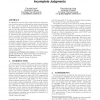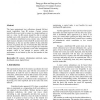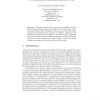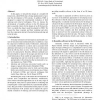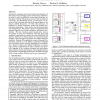135
click to vote
SIGIR
2010
ACM
14 years 8 months ago
2010
ACM
All search in the real-world is inherently interactive. Information retrieval (IR) has a firm tradition of using simulation to evaluate IR systems as embodied by the Cranfield par...
125
click to vote
ICTIR
2009
Springer
14 years 11 months ago
2009
Springer
The paper makes three points of significance for IR research: (1) The Cranfield paradigm of IR evaluation seems to lose power when one looks at human instead of system performance....
126
click to vote
SIGIR
2010
ACM
15 years 2 months ago
2010
ACM
In information retrieval (IR), research aiming to reduce the cost of retrieval system evaluations has been conducted along two lines: (i) the evaluation of IR systems with reduced...
143
click to vote
TREC
2007
15 years 3 months ago
2007
Every day, people widely use information retrieval (IR) systems to answer their questions. We utilized the TREC 2007 complex, interactive question answering (ciQA) track to measur...
165
click to vote
CATA
1998
15 years 3 months ago
1998
The large unstructured text collections demand full-text search capabilities from IR systems. Current systems typically allow users only to connect to a single database (or site) ...
ECIR
2008
Springer
15 years 3 months ago
2008
Springer
This paper introduces the concept of accessibility from the field of transportation planning and adopts it within the context of Information Retrieval (IR). An analogy is drawn bet...
109
click to vote
SIGIR
1995
ACM
15 years 5 months ago
1995
ACM
In this paper, we describe the design of a reusable IR framework, called FIRE, that is being implemented to facilitate the development of IR systems. In addition, FIRE is designed...
102
click to vote
EATIS
2007
ACM
15 years 6 months ago
2007
ACM
MDIRS is methodology to define the actors and the steps to build efficiently information retrieval (IR) System. MDRIS main mission is to analyze, develop and evaluate mechanisms s...
167
click to vote
SIGIR
1996
ACM
15 years 6 months ago
1996
ACM
Information explosion across the Internet and elsewhere offers access to an increasing number of document collections. In order for users to e ectively access these collections, i...
140
click to vote
OOIS
2001
Springer
15 years 6 months ago
2001
Springer
Abstract. Design and development of information retrieval
IR
systems is a complex and expensive process. In the process of building an IR system, developers need to explore a lar...

